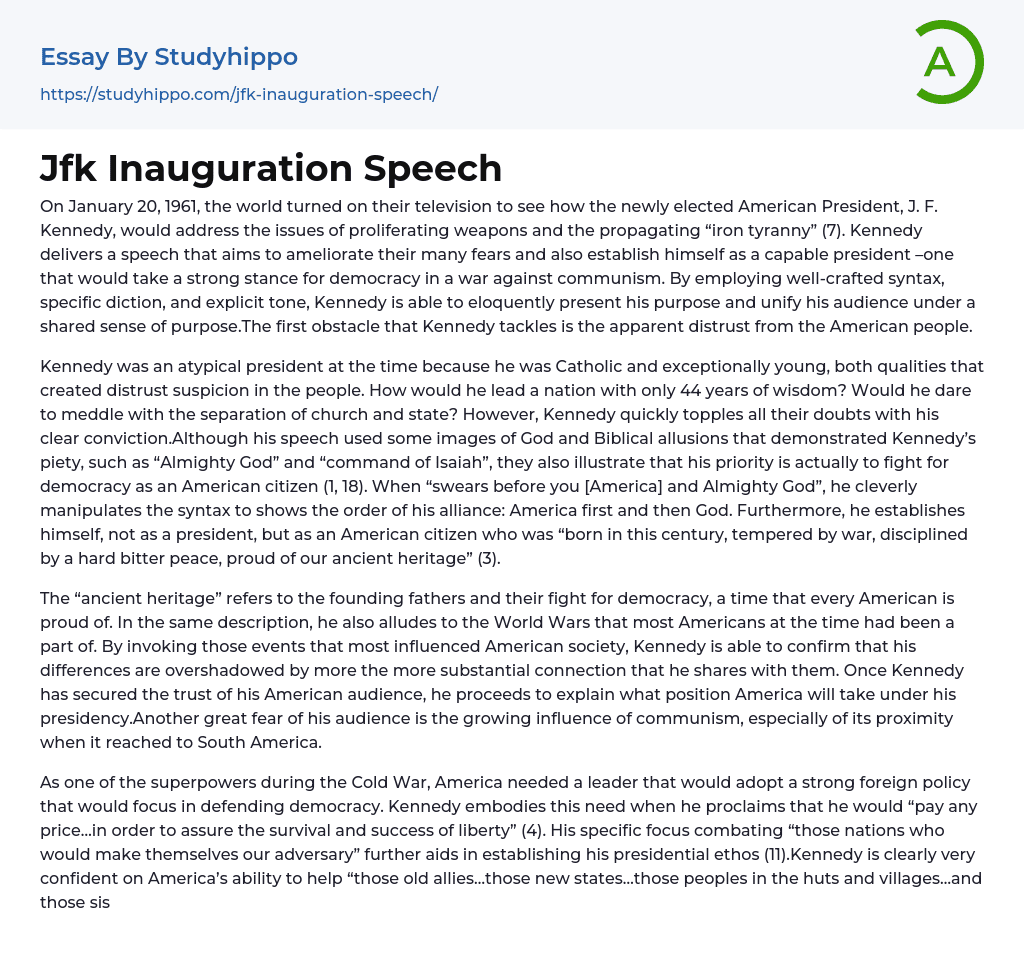In January 20, 1961, people around the world tuned in to watch the newly elected American President, J. F. Kennedy, address issues regarding the proliferation of weapons and iron tyranny. His speech aimed to alleviate fears and establish himself as a capable leader who would stand up for democracy in the fight against communism. Using carefully crafted syntax, specific diction, and explicit tone, Kennedy effectively presented his purpose and united his audience under a shared sense of direction. He first addressed the issue of distrust from the American people.Kennedy was a unique president for his time due to his youth and Catholicism, which made people suspicious and doubtful of his ability to lead. Despite this, Kennedy's strong conviction quickly proved his worth and silenced any doubts. His speeches often included references to God and the Bible, demonstrating his
...religious beliefs and piety. However, these references also highlighted that his highest priority was fighting for democracy as an American citizen. By swearing before America and God, he cleverly showed the order of his loyalty. He didn't assert himself as just a president, but as an American citizen who had been shaped by war, disciplined by a hard peace, and proud of the country's heritage. (1, 18) (3)
Kennedy evokes the "ancient heritage," which encompasses the founding fathers' fight for democracy, a moment that brings pride to all Americans. This period also alludes to the World Wars in which many Americans participated. These historic events greatly impacted American society and allow Kennedy to establish a strong bond with his audience. Despite any differences, Kennedy shares a significant connection that builds trust with the American people. He uses this
trust to clarify America's stance during his presidency. Additionally, Kennedy's audience worries about communism's expanding power, particularly its reach into South America.
During the Cold War, America's need for a strong foreign policy focused on defending democracy was embodied by Kennedy, who boldly proclaimed that he was willing to "pay any price...in order to assure the survival and success of liberty" (4). His specific focus on combating nations that posed a threat to the US helped establish his presidential ethos (11). Kennedy was confident in America's ability to aid its allies, new states, people in huts and villages, and sister republics south of its border (6, 7, 8, 9), particularly shown in his explicit denouncement of communism. Through his metaphor of dictatorships "riding the back of the tiger and ending up inside," Kennedy clearly stated that all such regimes are destined to fail (7).
In paragraph form, John F. Kennedy's references to communist nations and "hostile powers" that engage in aggression and subversion (9) are characterized by outright disdain that satisfies the American public's need for reassurance that the president will protect them. The aggressive tone cultivated by repeatedly using words like "anger" and "hostile" when speaking about communist countries is imposing. Instead of simply threatening other powers by stating "other powers should know," Kennedy uses a less commanding tone and says "let every other power know." Additionally, the use of certain language helps to reinforce Kennedy's purpose, as shown through his repeated use of the word "pledge," often in promising contexts.
The term "pledge" has a favorable meaning as it carries more weight than a mere promise and conveys sincerity. Its significance becomes even more prominent
when Kennedy refrains from using it while addressing communist nations. While assuring America and its allies of his commitment to ensure their welfare, he pledges to them, while to Russia and its allies, he requests favors. Additionally, Kennedy develops a closer bond with his audience by using personal pronouns such as "we," "us," and "my fellow citizens," instilling a sense of care and concern.
This speech by President Kennedy has a tone that suggests a shared responsibility in his presidency, emphasizing a human limitation. He highlights America's role in protecting human rights, instead of solely his own. The speech's celebratory and inspirational tone reassures the audience that Kennedy is allied with America. Overall, Kennedy's inaugural speech effectively met viewer expectations and approached the bipolar world with a similarly bipolar rhetoric.
His address to different groups was marked by a clear contrast in his use of tone and language, revealing his presidential ambitions. Through his eloquent words, he has positioned himself as a capable defender of both America and the principles of democracy worldwide.
- Business Law essays
- Contract essays
- Consumer Protection essays
- Property essays
- Ownership essays
- Agreement essays
- Common Law essays
- Contract Law essays
- Justice essays
- Security essays
- Tort Law essays
- United States Constitution essays
- Crime essays
- Lawsuit essays
- Treaty essays
- Family Law essays
- Marijuana Legalization essays
- Constitution essays
- War on Drugs essays
- Court essays
- Jury essays
- Police essays
- Protection essays
- Community Policing essays
- Criminal Law essays
- Judge essays
- Lawyer essays
- Employment Law essays
- Copyright Infringement essays
- Injustice essays
- Intellectual Property essays
- Breach Of Contract essays
- Jurisprudence essays
- Social Injustice essays
- Juvenile Justice essays
- Internet Privacy essays
- Cyber Security essays
- Bill Of Rights essays
- Civil Liberties essays
- First Amendment To The United States Constitution essays
- Fourth Amendment To The United States Constitution essays
- Second amendment essays
- Animal Cruelty essays
- Law Enforcement essays
- Juvenile Justice System essays
- Surveillance essays
- Forensic Science essays
- Crime Prevention essays
- Criminal Justice essays
- Criminology essays




